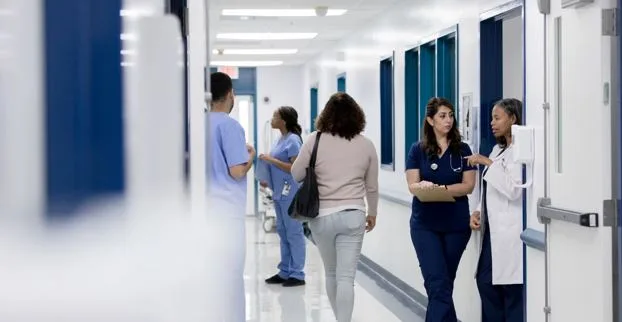Licensed Security for Healthcare Facilities: What You Need to Know
The Importance of Security Guards in Ontario Healthcare Facilities
Rise in Workplace Violence and Visitor Aggression
Healthcare settings are no longer immune to acts of aggression. Ontario hospitals and clinics frequently report cases of verbal abuse, physical altercations, and emotional distress caused by patients or visitors. Security guards help de-escalate these situations, ensuring the safety of healthcare workers and patients. Their presence also acts as a deterrent against potential confrontations, offering reassurance to both staff and visitors.
Protection of Staff, Patients, and Property
Security guards are trained to protect healthcare professionals and patients from both internal and external threats. Whether managing access to restricted areas or patrolling high-risk zones such as emergency departments, their responsibilities are critical. Guards help prevent theft, vandalism, and unauthorized access—especially in facilities that house expensive medical equipment or controlled substances.
Support for Emergency Response and Crowd Control
Healthcare facilities often face unpredictable situations—from medical emergencies to large influxes of patients during pandemics or mass casualty events. Licensed security guards assist in crowd control, guiding people to safety, enforcing lockdown procedures, and collaborating with first responders. Their training enables them to respond swiftly and calmly under pressure, playing a critical support role during emergencies.
Legal and Licensing Requirements in Ontario
Licensed security guards working in Ontario’s healthcare facilities must adhere to strict legal and training standards under provincial law. Here’s what you need to know:
- Licensing under the Private Security and Investigative Services Act (PSISA)
Every security guard in Ontario must hold a valid licence issued under the PSISA, 2005 . This licence authorises them to work and must be held by both the individual and any agency employing them. - Mandatory Criminal Background Checks
Applicants must provide a Criminal Record and Judicial Matters Check (CRJMC) issued within the past six months, confirming they have no disqualifying convictions as defined by Regulation 37/08. This clean-record requirement ensures candidates are suitable for roles involving vulnerable patients and sensitive environments. - Approved Training and Provincial Exam
Prospective security guards must complete at least 40 hours of approved training. This includes instruction under the PSISA, Code of Conduct, emergency response, use‑of‑force, report writing, and a minimum of Emergency First Aid and CPR certification . Candidates must also pass a provincially administered multiple‑choice exam to earn a Testing Completion Number before applying for their licence. - Displaying or Producing the Licence upon Request
Security guards must carry their licence while on duty and must identify themselves and present the licence—now digital, printable, or on a mobile device—upon request. Failure to do so can result in penalties .
Unique Challenges Faced by Security Guards in Healthcare Settings
Managing High-Stress Situations with Patients and Families
Hospitals are high-pressure environments where emotions often run high. Security guards frequently deal with distraught family members, patients in pain or distress, and situations involving grief or trauma. In these moments, guards must stay calm, use active listening, and apply de-escalation techniques to prevent situations from spiralling into aggression or violence.
Navigating Privacy Laws (e.g., PHIPA)
Security personnel must strictly adhere to Ontario’s Personal Health Information Protection Act (PHIPA), which governs the collection, use, and disclosure of personal health information. Guards cannot access or share patient information unless specifically required for safety or legal reasons. Understanding and respecting these legal boundaries is essential in maintaining patient confidentiality and avoiding legal repercussions.
Monitoring Restricted Areas Like ERs or Psychiatric Units
Certain areas in healthcare settings—such as emergency rooms, operating theatres, or psychiatric wards—require heightened vigilance. Guards must enforce access controls, prevent unauthorized entry, and respond quickly to volatile situations. In psychiatric units, for instance, guards often support healthcare teams during patient outbursts or when there’s a risk of self-harm or harm to others.
Handling Mental Health Crises with De-escalation Tactics
Security guards are increasingly called upon to manage mental health-related incidents. Whether in a waiting room or a mental health facility, they may encounter individuals in crisis. Guards must be skilled in non-violent crisis intervention, use trauma-informed approaches, and know when to call for clinical or police assistance. Their goal is always to reduce harm while maintaining a safe environment for all.
Key Responsibilities of Licensed Healthcare Security Guards
Controlling Access Points and Visitor Screening
One of the most essential duties is managing who enters and exits the facility. Security guards monitor access points, enforce visiting hours, and ensure all visitors are screened in accordance with hospital policies and public health protocols. They may issue visitor passes, check identification, and intervene if someone attempts unauthorized entry—especially in maternity wards, ICUs, or COVID-restricted zones.
Assisting with Patient Transport in High-Risk Cases
Security guards are often called to assist in transporting patients who may pose a risk to themselves or others. This can include individuals in psychiatric care, those under police custody, or patients exhibiting aggressive behaviour. Guards ensure these transports are carried out safely and securely, often working alongside clinical teams and paramedics.
Responding to Code Situations (e.g., Code White – Violent Person)
Ontario hospitals use a standardized emergency colour code system. One of the most critical for security personnel is Code White, which involves managing violent or aggressive individuals. Security guards are trained to respond rapidly, assess the threat, and help de-escalate the situation using non-violent techniques—or, if necessary, physical intervention within legal limits.
Supporting Staff During Behavioural Incidents
Frontline healthcare workers are increasingly encountering behavioural issues stemming from mental health crises, substance use, or stress-related outbursts. Security guards provide backup to nurses, doctors, and administrative staff during such incidents. Their presence acts as both a deterrent and a source of support, helping to reduce injury risk and preserve a safe working environment.
Soft Skills and Training Requirements for Healthcare Security
De-escalation and Conflict Resolution
Healthcare security guards frequently face tense situations involving distressed patients, emotional family members, or individuals experiencing mental health episodes. Being able to de-escalate these conflicts calmly—without using force—is a critical skill. Guards are trained in verbal de-escalation techniques and situational awareness to prevent situations from escalating unnecessarily.
Communication and Empathy
Clear, respectful communication is vital in healthcare environments. Guards must be able to speak calmly and assertively while listening to concerns without judgment. Showing empathy—especially when interacting with patients in pain, families dealing with grief, or individuals with special needs—builds trust and diffuses tension.
Cultural Sensitivity and Working with Vulnerable Populations
Ontario’s healthcare settings are culturally diverse, serving people of all ages, abilities, and backgrounds. Security guards must understand how to interact with Indigenous communities, newcomers, seniors, people with disabilities, and others with cultural or linguistic differences. Training in cultural competency ensures they can provide appropriate, respectful service to all individuals.
CPR and First Aid Certifications Often Preferred
While not legally mandatory beyond the Emergency First Aid requirement in basic training, many employers in healthcare prefer or require guards to hold current certifications in CPR and advanced first aid. These qualifications enable guards to respond effectively in medical emergencies until clinical staff arrive.
Benefits of Hiring a Licensed Security Guard for Ontario Healthcare Facilities
Ensures Compliance with Provincial Regulations
Licensed guards meet the standards set out in Ontario’s Private Security and Investigative Services Act (PSISA). This includes background screening, formal training, testing, and adherence to a provincial Code of Conduct. Employing unlicensed personnel puts healthcare institutions at risk of violating provincial law and could result in regulatory penalties.
Reduces Liability for Healthcare Institutions
Security incidents in hospitals—whether involving injury, privacy breaches, or property damage—can expose institutions to lawsuits and insurance claims. Licensed guards are trained in legal boundaries, documentation, and incident reporting, which reduces the risk of misconduct and strengthens the facility’s legal defence if an issue arises.
Enhances Safety and Public Trust
The presence of uniformed, licensed guards reassures patients, families, and staff that safety is a top priority. These professionals are equipped to act quickly and appropriately in emergencies, diffusing potential threats and fostering a secure environment. Public trust is particularly vital in healthcare, where visitors expect dignity, order, and protection.
Professional Appearance and Conduct
Licensed security guards are held to high standards of professionalism, including appropriate dress, courteous behaviour, and ethical conduct. In a healthcare setting, where first impressions matter and interactions can be delicate, this professionalism contributes to the overall experience and reflects positively on the institution.





